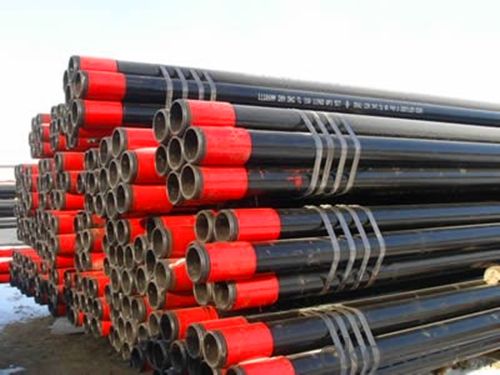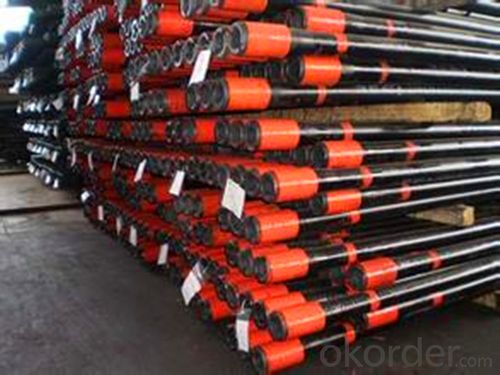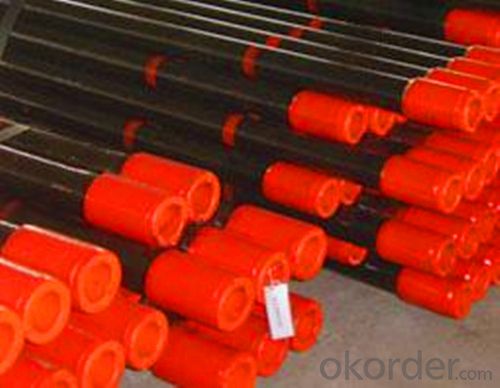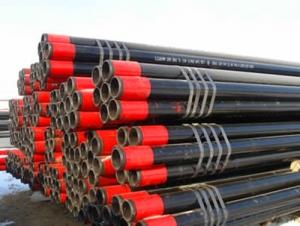Tubing Pipe of Grade N80 with API Standard
- Loading Port:
- Qingdao
- Payment Terms:
- TT OR LC
- Min Order Qty:
- 20 m.t.
- Supply Capability:
- 1000 m.t./month
OKorder Service Pledge
OKorder Financial Service
You Might Also Like
1. Structure of Tubing Pipe of Grade N80 Description
API 5CT Steel Pipe, N80Q Oil/Petroleum tubing Pipe, OCTG
1) Size: O.D. 1.900", 2-3/8", 2-7/8", 3-1/2", 4-1/2"
2) Grade: J55, N80, L80, C90, T95, P110
3) Wall thickness: 3.18 - 10.54mm
4) Length: R1,R2,R3
5) Thread: 8RD and 10RD
6) All our Tubing accord with API SPEC 5CT standard.
2. Main Features of Tubing Pipe of Grade N80
1) Advanced test for quality
2) MTC, COC provided
3) Supervision is welcome
3. Tubing Pipe of Grade N80 Images



4. Tubing Pipe of Grade N80 Specification
Size Destination | Weight Destination | Outside Diameter | Wall Thickness | Type of End Finish | ||||||||
Grade | ||||||||||||
T&C Non-Upset | T&C External Upset | in | mm | in | mm | J55 K55 | L80 | N80 | C90 | T95 | P110 | |
1.900 | 2.40 | - | 1.900 | 48.26 | 0.125 | 3.18 | PI | - | - | - | - | - |
2.75 | 2.90 | 0.145 | 3.68 | PNUI | PNUI | PNUI | PNUI | PNUI | - | |||
3.65 | 3.73 | 0.200 | 5.08 | PU | PU | PU | PU | PU | PU | |||
4.42 | - | 0.250 | 6.35 | - | P | - | P | P | - | |||
5.15 | - | 0.300 | 7.62 | - | P | - | P | P | - | |||
2 3/8 | 4.00 | - | 2.375 | 60.3 | 0.167 | 4.24 | PN | PN | PN | PN | PN | - |
4.00 | 4.70 | 0.190 | 4.83 | PNU | PNU | PNU | PNU | PNU | PNU | |||
5.80 | 5.95 | 0.254 | 6.45 | - | PNU | PNU | PNU | PNU | PNU | |||
6.60 | - | 0.259 | 7.49 | P | P | P | P | P | - | |||
7.35 | 7.45 | 0.336 | 8.53 | PU | PU | PU | PU | PU | - | |||
2 7/8 | 6.40 | 6.50 | 2.875 | 73.02 | 0.217 | 5.51 | PNU | PNU | PNU | PNU | PNU | PNU |
7.80 | 7.90 | 0.276 | 7.01 | - | PNU | PNU | PNU | PNU | PNU | |||
8.60 | 8.70 | 0.308 | 7.82 | - | PNU | PNU | PNU | PNU | PNU | |||
9.35 | 9.45 | 0.340 | 8.64 | - | PU | - | PU | PU | - | |||
10.50 | - | 0.392 | 9.96 | - | P | - | P | P | - | |||
11.50 | - | 0.440 | 11.18 | - | P | - | P | P | - | |||
3 1/2 | 7.70 | - | 3.500 | 88.9 | 0.216 | 5.49 | PN | PN | PN | PN | PN | - |
9.20 | 9.30 | 0.254 | 6.45 | PUN | PUN | PUN | PNU | PNU | PUN | |||
10.20 | - | 0.289 | 7.34 | PN | PN | PN | PN | PN | - | |||
12.70 | 12.95 | 0.375 | 9.53 | - | PUN | PUN | PNU | PNU | PUN | |||
14.30 | - | 0.430 | 10.92 | - | P | - | P | P | - | |||
15.50 | - | 0.476 | 12.00 | - | P | - | P | P | - | |||
17.00 | - | 0.530 | 13.46 | - | P | - | P | P | - | |||
4 | 9.50 | - | 4.00 | 101.6 | 0.226 | 5.74 | PN | PN | PN | PN | PN | PN |
10.70 | 11.00 | 0.262 | 6.65 | PU | PU | PU | PU | PU | PU | |||
4 1/2 | 12.60 | 12.75 | 4.500 | 114.3 | 0.271 | 6.88 | PNU | PNU | PNU | PNU | PNU | - |
15.20 | - | 0.337 | 8.56 | - | P | - | P | P | - | |||
17.00 | - | 0.380 | 9.65 | - | P | - | P | P | - | |||
18.90 | - | 0.430 | 10.92 | - | P | - | P | P | - | |||
21.50 | - | 0.500 | 12.70 | - | P | - | P | P | - | |||
23.70 | - | 0.560 | 14.22 | - | P | - | P | P | - | |||
26.10 | - | 0.630 | 16.00 | - | P | - | P | P | - | |||
5. FAQ of Tubing Pipe of Grade N80
We have organized several common questions for our clients,may help you sincerely:
①How about your company?
One of the leading manufacturers and suppliers specializing in steel pipe products in China, mainly offering four series steel pipes including welded steel pipe (ERW, SSAW, LSAW and square and rectangle pipe), seamless steel pipe, hot dipped galvanized steel pipe and steel pipe with 3 layer polythene coating. We can provide customers different specification standards e.g. ASTM A53, ASTM A106, BS1387, API 5L, API 5CT, ISO3183 and etc. Our scope of supplying covers from 1/2" to 48" for the outside diameter of welded pipes, and 1/8" to 20" for the seamless pipes.
Other than steel pipes we are also capable of supplying a wide variety of pipeline accessories, steel pipe fittings; valves etc. consists of our one-stop sales. The integrated sales & service ensures customers with various demands an easier access for purchasing management.
②How to guarantee the quality of the products?
We have established the international advanced quality management system,every link from raw material to final product we have strict quality test;We resolutely put an end to unqualified products flowing into the market. At the same time, we will provide necessary follow-up service assurance.
③How long can we receive the product after purchase?
In the purchase of product within three working days, We will arrange the factory delivery as soon as possible.
- Q:What does carbon seamless steel pipe mean? What is the difference between a seamless 20# and an ordinary one? What is it used in detail?
- Carbon steel is relatively alloy steel. Its carbon content is higher than alloy steel, and 20# steel is one kind of carbon steel.
- Q:How are steel pipes coated to prevent internal corrosion?
- Steel pipes are coated to prevent internal corrosion by applying a protective layer or coating, such as epoxy or polyethylene, on the inner surface of the pipes. This coating acts as a barrier, preventing contact between the steel and corrosive substances in the fluid being transported, thereby reducing the risk of corrosion.
- Q:How do steel pipes perform in high-temperature environments?
- Steel pipes perform well in high-temperature environments due to their excellent heat resistance properties. They can withstand elevated temperatures without losing their structural integrity or strength. Additionally, steel pipes have low thermal expansion, which reduces the risk of deformation or cracking under extreme heat. This makes steel pipes a reliable choice for various applications in industries such as oil and gas, power generation, and chemical processing, where high temperatures are common.
- Q:How are steel pipes used in the construction of shipbuilding?
- Steel pipes are commonly used in shipbuilding for various purposes such as transporting fluids, supporting structures, and providing stability. They are used for the construction of the ship's hull, bulkheads, and compartments, as well as for the installation of water, fuel, and ventilation systems. Steel pipes are also utilized for the construction of masts, rigging, and other ship components that require strength and durability.
- Q:Can steel pipes be used for underground heating systems?
- Yes, steel pipes can be used for underground heating systems. Steel is a durable and robust material that can withstand the pressure and temperature requirements of heating systems. Additionally, steel pipes are resistant to corrosion, which is crucial for underground applications where exposure to moisture and other elements is common.
- Q:What industries typically use steel pipes?
- Steel pipes find widespread use across various industries due to their durability, strength, and versatility. Some of the sectors that typically employ steel pipes include: 1. Construction: Steel pipes are extensively utilized in the construction industry for diverse purposes like structural support, plumbing, and underground piping systems. They are commonly seen in commercial buildings, residential structures, bridges, and tunnels. 2. Oil and gas: The oil and gas industry heavily relies on steel pipes for drilling, transporting, and distributing oil and gas. Steel pipes are employed in offshore drilling rigs, oil refineries, natural gas processing plants, and pipelines to ensure the safe and efficient transport of these valuable resources. 3. Water and wastewater: Steel pipes play a crucial role in providing clean water supply and managing wastewater. They are used in water treatment plants, desalination facilities, and municipal water distribution systems. Steel pipes are also essential for sewage and stormwater management. 4. Manufacturing: Various manufacturing industries employ steel pipes for specific applications. For example, automobile manufacturers use steel pipes in exhaust systems, fuel lines, and hydraulic systems. Steel pipes are also utilized in the production of machinery, equipment, and appliances. 5. Mining: The mining industry requires robust and enduring materials for its operations. Steel pipes are used in mining applications such as conveying materials, ventilation systems, and underground infrastructure. They prove particularly useful in transporting minerals, ores, and other mining byproducts. 6. Energy and power: Steel pipes find extensive use in power generation facilities, including thermal power plants, nuclear power plants, and renewable energy installations. They are employed in steam pipelines, cooling systems, and heat exchangers. Steel pipes are also used in the construction of transmission lines for electricity distribution. 7. Infrastructure and transportation: Steel pipes are essential for infrastructure development and transportation systems. They are used in the construction of roads, bridges, railways, and airports. Steel pipes also play a role in the transportation of fluids and gases, such as in natural gas or petroleum product pipelines. Overall, the versatility and dependability of steel pipes make them indispensable in a wide range of industries, contributing to various aspects of our modern infrastructure and daily lives.
- Q:What are the factors to consider when designing a steel pipe system?
- When designing a steel pipe system, several factors need to be considered to ensure its functionality, durability, and efficiency. These factors include: 1. Pressure and temperature requirements: Determining the maximum pressure and temperature that the steel pipe system will be exposed to is crucial. This information is essential for selecting the appropriate pipe material, thickness, and jointing method to withstand the system's operating conditions. 2. Pipe material: Choosing the right material for the steel pipe system is important. Factors such as corrosion resistance, strength, and cost should be considered. Common materials for steel pipes include carbon steel, stainless steel, and alloy steel. 3. Pipe size and thickness: Calculating the adequate pipe size and wall thickness is essential to ensure the required flow rate and pressure drop within the system. The pipe size affects the system's efficiency and must be chosen based on the anticipated flow rates and pressure losses. 4. Support and anchoring: Proper support and anchoring are critical to prevent sagging, movement, and stress on the steel pipe system. The design should consider the weight of the pipes, the fluid being transported, and any external forces that may act on the system. 5. Expansion and contraction: Steel pipes expand and contract with temperature variations, causing stress on the system. Expansion joints or loops should be incorporated to allow for thermal growth and contraction, preventing damage and distortion. 6. Fluid compatibility: Understanding the properties of the fluid being transported, such as corrosiveness, viscosity, and potential for sedimentation or scaling, is important in selecting the appropriate pipe material and protective coatings or linings. 7. Accessibility and maintenance: Consideration should be given to the accessibility of the system for installation, inspection, and maintenance purposes. Proper access points, valves, and fittings should be included in the design to allow for easy maintenance and repairs. 8. Environmental factors: The steel pipe system may be exposed to various environmental conditions, such as extreme temperatures, humidity, or corrosive substances. These factors should be considered when selecting the pipe material, protective coatings, and insulation. 9. Regulatory compliance: Compliance with applicable industry standards, codes, and regulations is essential. The design should adhere to safety guidelines and applicable building codes to ensure the pipe system's integrity and longevity. 10. Cost consideration: Finally, the overall cost of the steel pipe system, including material, installation, maintenance, and energy consumption, should be taken into account. Balancing cost-effectiveness with performance requirements is crucial in achieving an efficient and economical design. By considering these factors, engineers and designers can create a steel pipe system that is suitable for its intended purpose, ensuring its longevity, reliability, and safety.
- Q:What is the weight of a steel pipe?
- The weight of a steel pipe can vary depending on its dimensions and thickness.
- Q:How do steel pipes handle soil movement?
- Steel pipes are able to handle soil movement quite well due to their inherent strength and durability. The rigid nature of steel pipes allows them to withstand ground shifting, settling, and other soil movements without significant deformation or damage. Additionally, steel pipes can be reinforced with additional supports and anchoring systems to further enhance their ability to handle soil movement.
- Q:What are the different methods of protecting steel pipes from corrosion?
- There are several methods of protecting steel pipes from corrosion, including: 1. Coatings: Applying protective coatings such as epoxy, polyethylene, or zinc to the surface of the steel pipes can create a barrier against corrosive elements. 2. Cathodic Protection: This method involves installing sacrificial anodes or impressed current systems to provide a protective current that counteracts the corrosion process. 3. Corrosion Inhibitors: Adding chemicals or inhibitors to the fluid or environment surrounding the pipes can reduce the rate of corrosion. 4. Internal Linings: Applying internal linings made of resin, cement, or other materials can protect the inner surface of the pipes from corrosion caused by the transported fluid. 5. Design Considerations: Implementing proper design practices like avoiding sharp bends and crevices, ensuring proper drainage, and using corrosion-resistant alloys can help prevent corrosion in steel pipes.
1. Manufacturer Overview |
|
|---|---|
| Location | |
| Year Established | |
| Annual Output Value | |
| Main Markets | |
| Company Certifications | |
2. Manufacturer Certificates |
|
|---|---|
| a) Certification Name | |
| Range | |
| Reference | |
| Validity Period | |
3. Manufacturer Capability |
|
|---|---|
| a)Trade Capacity | |
| Nearest Port | |
| Export Percentage | |
| No.of Employees in Trade Department | |
| Language Spoken: | |
| b)Factory Information | |
| Factory Size: | |
| No. of Production Lines | |
| Contract Manufacturing | |
| Product Price Range | |
Send your message to us
Tubing Pipe of Grade N80 with API Standard
- Loading Port:
- Qingdao
- Payment Terms:
- TT OR LC
- Min Order Qty:
- 20 m.t.
- Supply Capability:
- 1000 m.t./month
OKorder Service Pledge
OKorder Financial Service
Similar products
New products
Hot products
Related keywords































